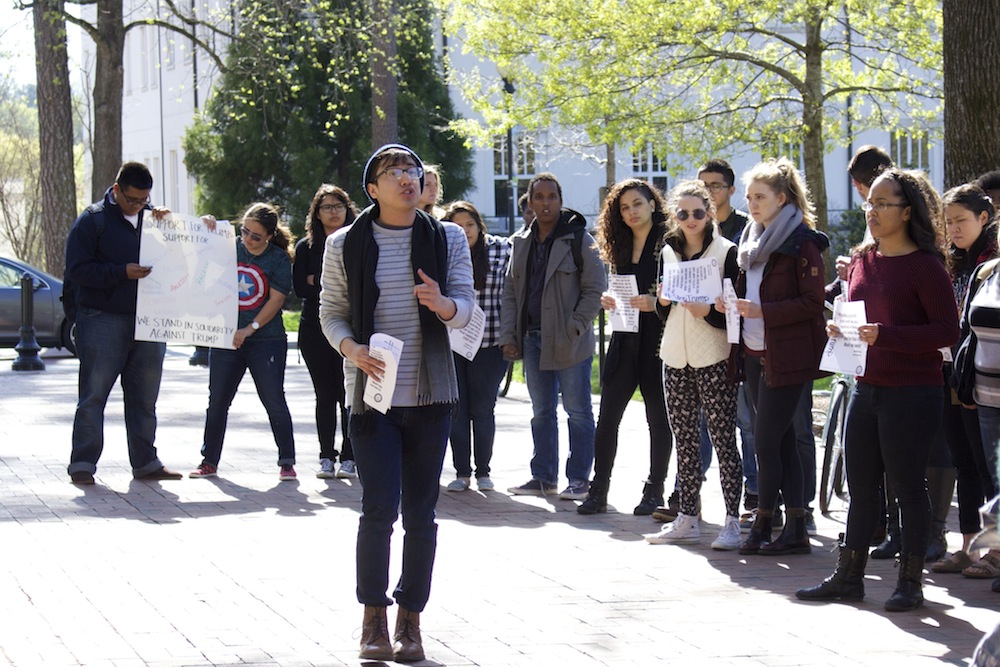
On Monday, approximately 40 students at Emory University drew up signs that read “Stop Trump” and “Stop Hate.” They gathered at the foot of the administration building, chanting phrases like “You are not listening!” and “We are in pain!” They demanded a meeting with President James Wagner. According to the Emory Wheel, the campus paper, they walked into the administration building shouting, “It is our duty to fight for our freedom. It is our duty to win. We must love each other and support each other.” They even yelled, “We have nothing to lose but our chains.”
Freedom? Chains? One would have thought that Emory had made Donald Trump the next chair of its center of ethics. Or had just invited Trump to be commencement speaker (after all, they did have Ben Carson wax poetic in 2012). If only the spark were so sensible. Rather, the protests came about merely because someone had written the words “Trump 2016” and “Accept the Inevitable: Trump 2016” in chalk on sidewalks around campus.
As an Emory graduate, I find this overreaction deeply embarrassing. Three years ago I was editor-in-chief of the Emory Wheel during one of the more turbulent episodes in the school’s 153-year history. In the fall of 2012, the school abruptly announced that it was shutting down several departments, including journalism, and the graduate programs in economics and Spanish. The move blindsided students and professors alike, and the rest of the academic year saw a series of sit-ins and protests. I watched professors berate the dean in faculty meetings. I watched police haul protesters off campus. At stake was the very direction of the university and whether its leaders were the right people to determine it.
But protests over a political endorsement? Written in chalk? Colleges today are blamed for coddling a fragile generation of students who are terrified of disagreement. The protests at Emory only give the anti-P.C. crowd more ammunition. As one student told the Wheel, “I’m supposed to feel comfortable and safe [here], but [Trump] is being supported by students on our campus and our administration shows that they, by their silence, support it as well . . . I don’t deserve to feel afraid at my school.”
Students reportedly asked Wagner to send a campus-wide email denouncing Trump, as if that would accomplish anything. One has to wonder: If the written words “Trump” are enough to send some students into a tailspin, how do they react to sound bites of Trump on NPR or clips of him on cable television? Do they unplug the TV? Do they submerge the radio in a vat of acid?
The concerns of these students come from a good place. It is the same place that has brought attention to issues of mental health, equality, and race on campus. But to find solutions to these problems, they’ll have to address those pushing back, those who believe there isn’t a problem at all. And isn’t that sort of the whole point of college, a chance to challenge and study one’s own beliefs and the beliefs of others?
Wagner released a statement promising to implement “immediate refinements to certain policy and procedural deficiencies, regular and structured opportunities for difficult dialogues, a formal process to institutionalize identification, review and [the] addressing of social justice opportunities and issues and a commitment to an annual retreat to renew our efforts.” In case you just got lost in Wagner’s argle bargle, that’s shorthand for, “I’m going to finish season 4 of House of Cards.”
It’s not up to the university president to concoct a panacea every time a student feels threatened by other people’s opinions. Does nobody remember high school? Every day was a minefield of pubescent anxiety that we all had to navigate on our own. In college, the burden should again be on the students. Only this time, the challenge isn’t finding a prom date. It’s deciding how best to frame and plant a righteous cause in fertile ground, around which an entire campus can rally behind.










![The North Carolina Museum of Natural Sciences’ newest exhibit is a [pre]historic first](https://cdn2.atlantamagazine.com/wp-content/uploads/sites/4/2024/04/DD-3-100x70.jpg)



